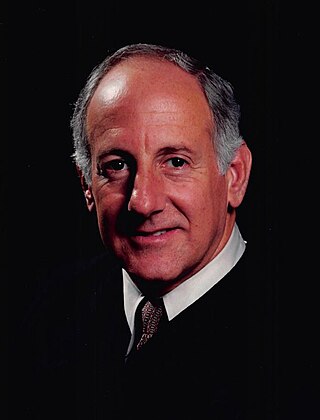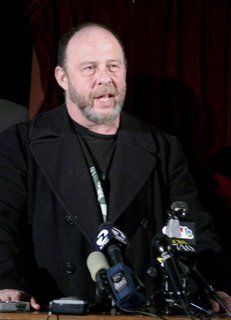Related Research Articles

Diane Alexis Whipple was an American lacrosse player and college coach. She was killed in a dog attack in San Francisco on January 26, 2001. The dogs involved were two Presa Canarios. Paul Schneider, the dogs' owner, is a high-ranking member of the Aryan Brotherhood and is serving three life sentences in state prison. The dogs were looked after by Schneider's attorneys, Robert Noel and Marjorie Knoller, a husband and wife who lived in the same apartment building as Whipple. After the fatal attack, the state brought criminal charges against the attorneys. Noel, who was not present during the attack, was convicted of manslaughter. Knoller, who was present, was charged with implied-malice second-degree murder and convicted by the jury. Knoller's murder conviction, an unusual result for an unintended dog attack, was rejected by the trial judge but ultimately upheld. The case clarified the meaning of implied malice murder.

David Newton Eagleson was an American lawyer who served as an associate justice of the Supreme Court of California from 1987 to 1991.

Ronald Marc George is an American jurist. He previously served as the 27th Chief Justice of California from 1996 to 2011. Governor Pete Wilson appointed George as an associate justice of the Supreme Court in 1991 and elevated George to Chief Justice in 1996.

The California Department of Corrections and Rehabilitation (CDCR) is the penal law enforcement agency of the government of California responsible for the operation of the California state prison and parole systems. Its headquarters are in Sacramento.

William Harrison Waste was the 21st Chief Justice of California.

Lorenzo Sawyer was an American lawyer and judge who was appointed to the Supreme Court of California in 1860 and served as the ninth Chief Justice of California from 1868 to 1870. He served as a United States circuit judge of the United States Circuit Courts for the Ninth Circuit and of the United States Court of Appeals for the Ninth Circuit. He is best known for handing down the verdict in the case of Woodruff v. North Bloomfield Gravel Mining Company; his verdict is frequently referred to as the "Sawyer Decision."

Martin Joseph Jenkins is an American attorney and jurist serving as an associate justice of the Supreme Court of California. He was previously a justice of the California Court of Appeal for the First District, located in San Francisco, and a former United States district judge of the United States District Court for the Northern District of California.

Stuart Hanlon is an attorney based in San Francisco, California who represented San Francisco Police Chief Greg Suhr, Geronimo Pratt and members of the Symbionese Liberation Army.
The Barry Bonds perjury case was a case of alleged perjury regarding use of anabolic steroids by former San Francisco Giants outfielder and all-time Major League Baseball (MLB) career home run leader, Barry Bonds, and the related investigations surrounding these accusations. On April 13, 2011, Bonds was convicted of one felony count of obstruction of justice for giving an incomplete answer to a question in grand jury testimony. A mistrial was declared on the remaining three counts of perjury, and those charges were dropped. The obstruction of justice conviction was upheld by an appellate panel in 2013, but a larger panel of the appellate court exonerated him in 2015 by a 10-1 vote.
The San Quentin Six were six inmates at San Quentin State Prison in the U.S. state of California who were charged with actions related to an August 21, 1971, escape attempt that resulted in six deaths and at least two people seriously wounded. The San Quentin Six were Fleeta Drumgo, David Johnson, Hugo Pinell, Johnny Larry Spain, Willie Tate, and Luis Talamantez. The dead included George Jackson, a co-founder of the Black Guerrilla Family; two other inmates, and three guards.

Kathryn Jocelyn Mickle Werdegar is a former Associate Justice of the Supreme Court of California, serving from June 3, 1994, to August 31, 2017.

Vaughn Richard Walker, Judge Vaughn R Walker, is an American lawyer who served as a United States district judge of the United States District Court for the Northern District of California from 1989 to 2011. Walker presided over the original trial in Hollingsworth v. Perry, where he found California's Proposition 8 to be unconstitutional.
Hollingsworth v. Perry was a series of United States federal court cases that re-legalized same-sex marriage in the state of California. The case began in 2009 in the U.S. District Court for the Northern District of California, which found that banning same-sex marriage violates equal protection under the law. This decision overturned California ballot initiative Proposition 8, which had banned same-sex marriage. After the State of California refused to defend Proposition 8, the official sponsors of Proposition 8 intervened and appealed to the Supreme Court. The case was litigated during the governorships of both Arnold Schwarzenegger and Jerry Brown, and was thus known as Perry v. Schwarzenegger and Perry v. Brown, respectively. As Hollingsworth v. Perry, it eventually reached the United States Supreme Court, which held that, in line with prior precedent, the official sponsors of a ballot initiative measure did not have Article III standing to appeal an adverse federal court ruling when the state refused to do so.
Coleman v. Schwarzenegger, docket no. 2:90-cv-00520-LKK-JFM, is a federal class action civil rights lawsuit under the Civil Rights Act of 1871, Eighth and Fourteenth Amendment to the United States Constitution, and the Rehabilitation Act of 1973 alleging unconstitutional mental health care by the California Department of Corrections and Rehabilitation (CDCR).

Keker, Van Nest & Peters LLP is a litigation boutique located in San Francisco, California, founded in 1978. The firm's areas of practice include intellectual property, professional liability, class actions, wrongful termination defense, general contract and commercial litigation, antitrust, white collar crime, and appellate.
Five people were found dead at a home in Ingleside, San Francisco, United States on the morning of Friday, March 23, 2012. The victims, all Chinese immigrants, were an elderly couple, two of their adult children, and their daughter-in-law. In Chinese-language media both in the United States and overseas, which devoted the most coverage to the killings, the case was usually referred to as the Lei family quintuple slayings.

William Horsley Orrick III is an American lawyer who serves as a senior United States district judge of the United States District Court for the Northern District of California. He had a long career as a lawyer in private practice in San Francisco, and served as a Deputy Assistant Attorney General in the Civil Division of the United States Department of Justice during the Obama administration.

On July 1, 2015, 32-year-old Kathryn "Kate" Steinle was shot and killed while walking with her father and a friend along Pier 14 in the Embarcadero district of San Francisco. She was hit in the back by a single bullet. The man who fired the gun, José Inez García Zárate, said he had found it moments before, wrapped in cloth beneath a bench on which he was sitting, and that when he picked it up the weapon went off. The shot ricocheted off the concrete deck of the pier and struck the victim, who was about 90 feet (27m) away. Steinle died two hours later in a hospital as a result of her injuries.

Daniel Paul Collins is a United States circuit judge of the United States Court of Appeals for the Ninth Circuit.

Gibson's Bakery v. Oberlin College was an Ohio legal case concerning libel, tortious interference, and infliction of distress. The case ultimately involved questions about the responsibilities of universities during student protests.
References
- 1 2 3 4 5 "Appendix 4: Biographical Information and Acknowledgments". Report of the President's Commission on the Assassination of President John F. Kennedy. Washington, D.C.: United States Government Printing Office. 1964. p. 480.
- 1 2 3 "Honorable Stuart Pollak". California Courts of Appeal. Retrieved 2017-01-04.
- ↑ McKee, Mike (December 2, 2003). "Judicial Profile: Stuart Pollak". The Recorder. Retrieved April 11, 2017.
- ↑ "Interview with Stuart R. Pollak-recorded October 11, 2013". The Sixth Floor Museum at Dealey Plaza. Retrieved April 11, 2017.
- ↑ McCreery, Laura (2004). "Interview with Stuart R. Pollock" (PDF). University of California, Berkeley, Library. Retrieved April 11, 2017.
- ↑ "Minnick v. California Department of Corrections". Oyez. Retrieved April 11, 2017.
- ↑ "Tobacco giant's secret papers open to public". San Francisco Chronicle. May 26, 1995. Retrieved April 11, 2017.
- ↑ Finz, Stacy (August 3, 2000). "17 Bakery Workers Awarded $120 Million / Tears fill courtroom after racial bias verdict". San Francisco Chronicle. Retrieved April 11, 2017.
- ↑ Evangelista, Benny (November 9, 2000). "EBay Immune From Suits Over Pirated Music". San Francisco Chronicle. Retrieved April 11, 2017.